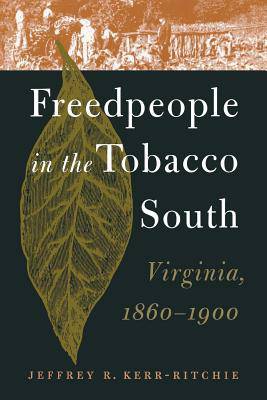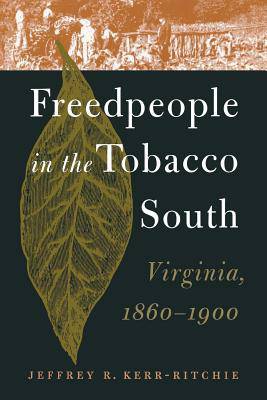
- Afhalen na 1 uur in een winkel met voorraad
- Gratis thuislevering in België vanaf € 30
- Ruim aanbod met 7 miljoen producten
- Afhalen na 1 uur in een winkel met voorraad
- Gratis thuislevering in België vanaf € 30
- Ruim aanbod met 7 miljoen producten
Zoeken
€ 64,45
+ 128 punten
Omschrijving
Throughout the colonial and antebellum periods, Virginia's tobacco producers exploited slave labor to ensure the profitability of their agricultural enterprises. In the wake of the Civil War, however, the abolition of slavery, combined with changed market conditions, sparked a breakdown of traditional tobacco culture. Focusing on the transformation of social relations between former slaves and former masters, Jeffrey Kerr-Ritchie traces the trajectory of this breakdown from the advent of emancipation to the stirrings of African American migration at the turn of the twentieth century.
Drawing upon a rich array of sources, Kerr-Ritchie situates the struggles of newly freed people within the shifting parameters of an older slave world, examines the prolonged agricultural depression and structural transformation the tobacco economy underwent between the 1870s and 1890s, and surveys the effects of these various changes on former masters as well as former slaves. While the number of older freedpeople who owned small parcels of land increased phenomenally during this period, he notes, so too did the number of freedom's younger generation who deserted the region's farms and plantations for Virginia's towns and cities. Both these processes contributed to the gradual transformation of the tobacco region in particular and the state in general.
Drawing upon a rich array of sources, Kerr-Ritchie situates the struggles of newly freed people within the shifting parameters of an older slave world, examines the prolonged agricultural depression and structural transformation the tobacco economy underwent between the 1870s and 1890s, and surveys the effects of these various changes on former masters as well as former slaves. While the number of older freedpeople who owned small parcels of land increased phenomenally during this period, he notes, so too did the number of freedom's younger generation who deserted the region's farms and plantations for Virginia's towns and cities. Both these processes contributed to the gradual transformation of the tobacco region in particular and the state in general.
Specificaties
Betrokkenen
- Auteur(s):
- Uitgeverij:
Inhoud
- Aantal bladzijden:
- 368
- Taal:
- Engels
Eigenschappen
- Productcode (EAN):
- 9780807847633
- Verschijningsdatum:
- 19/04/1999
- Uitvoering:
- Paperback
- Formaat:
- Trade paperback (VS)
- Afmetingen:
- 145 mm x 234 mm
- Gewicht:
- 566 g

Alleen bij Standaard Boekhandel
+ 128 punten op je klantenkaart van Standaard Boekhandel
Beoordelingen
We publiceren alleen reviews die voldoen aan de voorwaarden voor reviews. Bekijk onze voorwaarden voor reviews.











